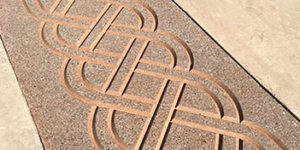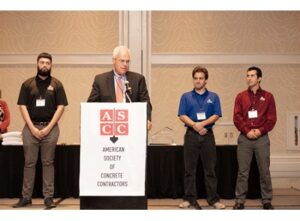Membership in an industry association or society offers numerous opportunities for education, peer networking, and accessing a wealth of information that helps us grow professionally. There are several organizations that support concrete contractors and concrete construction. Each organization has a unique focus, so understanding their missions and member benefits allows you to choose which organization will best serve your personal and business goals.
 ASCC Decorative Concrete Council
ASCC Decorative Concrete Council
The Decorative Concrete Council, a specialty council of the American Society of Concrete Contractors (ASCC), is solely dedicated to the issues and needs of the decorative concrete industry. Established in 1998, the DCC’s initial efforts were oriented toward contractor education and the promotion of decorative concrete to design professionals – architects, landscape architects, interior designers and engineers. Today, architectural promotion and technical training are still important, according to ASCC executive director Bev Garnant, but emphasis is also placed on helping concrete contractors become better businessmen. “Contractors often excel at their craft,” says Garnant, “but without an understanding of job costing, estimating, reading a contract, budgeting or negotiating, their businesses can struggle or even fail. These are very important business skills, particularly in today’s economy.”
An annual conference serves as the primary educational and training event for members. Technical and business seminars are on the agenda, as are evening social events, where there are opportunities to meet and network with contractors from around the country. The more casual gatherings are an excellent way for new members to meet other concrete contractors that have experienced the same challenges. “The open exchange of suggestions and advice between members is an incredible benefit of being part of the ASCC/DCC,” Garnant says.
Additional member benefits:
- Technical hotline: Calls addressed by ASCC technical director Ward Malisch, P.E., Ph.D.
- Safety hotline: Calls addressed by a Safety Council comprised of contractor members of the association. The council addresses safety questions related to concrete construction: fall safety, cement burns, pump safety and so on, as well as applicable OHSA regulations.
- E-mail forum: Questions are answered by other contractors
- Webinar series: Conducted monthly, each 45 to 60 minutes long, primarily focusing on business issues
- Decorative Concrete Awards program: An annual event at the World of Concrete convention
- MIX Groups (MIX stands for “Member Information Exchange”): Small groups (of five to 10 noncompeting contractors) focused on issues of the group members
 International Concrete Repair Institute
International Concrete Repair Institute
The mission of the International Concrete Repair Institute (ICRI) is to improve the quality of concrete restoration, repair and protection. Even though it is not an organization oriented toward decorative concrete, ICRI does provide support and technical information that could be important to the concrete craftsman, particularly if you install overlays, coatings, or even stains or dyes on existing concrete.
ICRI executive director Kelly Page believes that tech guideline 310.2-1997, a guideline for “Selecting and Specifying Concrete Surface Preparation for Sealers, Coatings and Polymer Overlays,” is an important publication for any concrete technician who requires precise surface preparation methods for successful product installations. The guideline details the best practices for achieving the proper surface requirements for specific materials.
As a supplemental aid to the technical bulletin, Concrete Surface Profile Chips are available. Fabricated from flexible molded rubber, the textured chips display varying surface profiles as discussed in the guideline. It’s a great visual aid to help you explain surface prep requirements and results in very clear communication with property owners and architects.
ICRI also offers its members a moisture-testing program for concrete slabs. The program provides contractors the knowledge and skills to better assess concrete-floor moisture conditions prior to applying floor coverings such as overlays, coatings and sealers. Contractors certified as ICRI Concrete Slab Moisture Testing Technicians are able to perform, record and interpret the four standard ASTM-designated moisture tests. “Attaining the certification provides many advantages for the concrete contractor,” says Kelly. “It significantly minimizes moisture-related product failures, and it is a good way for contractors to differentiate themselves from their competition.”
Additional member benefits:
- Numerous technical bulletins are available.
- Concrete Repair Bulletin is a bimonthly magazine featuring case studies, industry news and product information.
- The association’s 32 chapters offer the opportunity to network with local professionals.
 American Concrete Institute
American Concrete Institute
Probably the oldest organization for this industry, the American Concrete Institute was established in 1904 to advance concrete knowledge by conducting seminars, managing certification programs and publishing technical documents. The organization is represented in 108 countries.
ACI executive vice president Ron Burg, P.E., says that ACI’s most important member benefit is access to more than 120 technical, education and certification committees. “Participation on the committees provides a voice for contractors whose business is directly affected by the products, programs and standards produced by those committees,” he says.
ACI 302 Construction of Concrete Floors, ACI 303 Architectural Cast-in-Place Concrete, ACI 308 Curing Concrete and ACI 310 Decorative Concrete are examples of committees related to
concrete finishing. Burg says he encourages contractor involvement because contractors bring hands-on field experience to the discussions.
ACI provides Concrete Flatwork Finisher/Technician certification and related study material that addresses basic concrete technology. ACI is also developing a certification program for decorative concrete finishers and a craftsman-oriented guide for the installation of decorative concrete. The guide will serve as the primary study resource for certification candidates. The certification process hones a contractor’s knowledge and skills and is a credential valued by employers, architects, engineers and property owners.
Additional member benefits:
- ACI’s 98 chapters offer local opportunities for networking and professional growth.
- Seminars, training and certification are conducted year-round nationally.
- Online programs, such as continuing education and webinars.
- A bookstore with an extensive collection of concrete-construction publications.
 Construction Specifications Institute
Construction Specifications Institute
Lastly, if you are involved in architectural marketing – that is, promoting your products and expertise to designers and providing design consultation – then I feel a membership in the Construction Specifications Institute is invaluable. CSI’s membership comprises architects and specification writers, product reps and contractors. CSI has local chapters throughout the country. There are numerous opportunities to interact with the members: monthly meetings, technical, educational and social events, and even regional product shows. Being visible at these types of gatherings often makes it easier to get an appointment with an architect, since he or she already knows you.
CSI also offers Construction Documents Technology (CDT) certification, which provides comprehensive knowledge about the writing and management of construction documents. Architects recognize this credential, which, again, facilitates appointments with a design team for a project.
Benefit through participation
These are just a few associations that support our industry. All offer opportunities for education, so you can grow professionally, and networking, so you can grow your business. I am sure there are other organizations in your local market that would be important too.
Once you join an organization, remember, the greatest benefits are derived from your direct involvement or participation in the group. Attend meetings, be visible. Volunteer your time on committees. Become an officer or director. Mentor the new guy. Ask questions, but also be generous with your knowledge.















